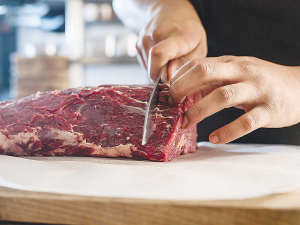Red meat rebound
The red meat sector is poised for a strong rebound this season, with export receipts forecast to top $10 billion and farm profitability to almost double.
 A new website has been launched which brings together independently-verified facts and insights about NZ beef and lamb from a health, nutrition and environmental perspective.
A new website has been launched which brings together independently-verified facts and insights about NZ beef and lamb from a health, nutrition and environmental perspective.
In an effort to counter misinformation about, and to promote the benefits of, NZ red meat, a new website was launched last week.
The www.makingmeatbetter.nz website, developed by Beef + Lamb New Zealand (BLNZ) and the Meat Industry Association, brings together independently-verified facts and insights about beef and lamb from a health, nutrition and environmental perspective.
BLNZ chief executive Sam McIvor says the motivation behind the website is to make it easier for New Zealanders to find the facts about the production and consumption of beef and lamb.
“New Zealand’s farming methods are different and more sustainable,” he says.
“However, a lot of what people hear about red meat production is based on international research and overseas farming systems.”
McIvor says it’s important that New Zealanders have access to the facts about how meat is produced in this country and what that means for their health and the environment. He adds that NZ’s farming is a model for how to produce healthy red meat in a sustainable way.
“The way we farm is better for animals, better for you, better for the planet and better for communities.”
McIvor says the website allows sheep and beef farmers to share the concerns of many of their customers about issues such as climate change, biodiversity loss and water quality.
“NZ red meat production already has some great environmental stories to tell. Our sheep and beef sector has a goal of net carbon neutrality by 2050 and is already a long way towards achieving this.”
He points out that greenhouse gas emissions from NZ sheep and beef farming have decreased by 30% since 1990, while production levels have remained stable – and during the same time, the sector has more than doubled its export receipts.
“The carbon footprint of sheep and beef production is around half the average figure globally.”
The website also includes facts about the health benefits of NZ red meat. Fiona Windle, a registered nutritionist at BLNZ, said consumers are also looking for reliable sources of information about diet and health.
“Like everyone, we hear a lot of polarising and confusing views out there about what’s good for us. The reality is grass-fed red meat, like we produce in New Zealand, plays an important part in a healthy and balanced diet.”
Sirma Karapeeva, chief executive of the Meat Industry Association, says NZ’s red meat sector supports wider rural communities including schools, local businesses and community facilities.
She says the sector accounts for nearly 5% of total employment in New Zealand – more than 92,000 people, on-farm and in processing and support services
“The NZ meat sector contributes income of $3,300 per year to every household in NZ and generates $12 billion in income per year for the country.”
Global trade has been thrown into another bout of uncertainty following the overnight ruling by US Supreme Court, striking down President Donald Trump's decision to impose additional tariffs on trading partners.
Controls on the movement of fruit and vegetables in the Auckland suburb of Mt Roskill have been lifted.
Fonterra farmer shareholders and unit holders are in line for another payment in April.
Farmers are being encouraged to take a closer look at the refrigerants running inside their on-farm systems, as international and domestic pressure continues to build on high global warming potential (GWP) 400-series refrigerants.
As expected, Fonterra has lifted its 2025-26 forecast farmgate milk price mid-point to $9.50/kgMS.
Bovonic says a return on investment study has found its automated mastitis detection technology, QuadSense, is delivering financial, labour, and animal-health benefits on New Zealand dairy farms worth an estimated $29,547 per season.

OPINION: Here w go: the election date is set for November 7 and the politicians are out of the gate…
OPINION: ECan data was released a few days ago showing Canterbury farmers have made “giant strides on environmental performance”.